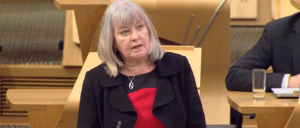
“How much time do they need?”
That is the question Highlands and Islands Labour MSP, Rhoda Grant, is asking after being advised that a promise made by the First Minister in 2008 to cut train journey times between Inverness and Edinburgh to 2 hours and 45 minutes is still not being delivered by the Scottish Government.
Mrs Grant, who is Vice-President and a great supporter of the Friends of the Far North Line, has been pushing the SNP government for many years to take heed of the concerns and needs of people in the Highlands to have reasonable public rail services to the central belt.
The commitment to reduce the journey time to 2 hours and 45 minutes was made by the then First Minister, Alex Salmond, at a Cabinet Meeting in Inverness Town House in 2008, shortly after his party took power at Holyrood.
The First Minister advised that the average journey time between Inverness and Edinburgh on the Highland Main Line would be reduced to 3hrs by 2011-12, with a fastest timing of 2 hours 45 minutes, by means of the installation of more passing loops, the extension of existing double track sections and signalling improvements.
Fifteen years later, after being pressed again by Mrs Grant, the new Transport Minister, Kevin Stewart, has advised the Regional MSP in an answer to a Parliamentary Question she tabled that he is “unable to commit to a date for delivering this journey time.” The Minister further advises that “The costs and benefits for delivering this need to be considered against those for delivering alternative rail enhancement projects, notably those that will contribute towards the decarbonisation of Scotland’s railway, within constrained funding.”
Rhoda Grant said “While the SNP continues to fail on promise after promise, this latest bodyblow for the Highlands will not be lost on our Highland communities who just want services comparable to what is available in the central belt.
“They’ve failed on their promise to dual the A9 by 2025, they will fail on dualling the A96 by 2030, they’ve failed on delivering the ferries that our island communities so desperately need and, going by the answer I’ve received, they have no intention of delivering on the commitment to reduce rail times either.”
Ian Budd of the Friends of the Far North Line said “This is disappointing, but not unexpected, news. The difficulty for the Scottish Government is that it has committed to achieving modal shift from road to rail but apparently cannot afford the investment needed to improve the railway sufficiently for this to happen.
“Electrification will make the journey somewhat faster but will not solve the problem of delays escalating in both directions when one service runs late. The Highland Main Line does not have sufficient capacity in its present form to meet the government’s modal shift targets.”
The text of the Parliamentary Question and answer is detailed below:-
2 May 2023
Index Heading: Transport Scotland
Rhoda Grant (Highlands and Islands) (Scottish Labour Party): To ask the Scottish Government, further to the answer to question S6W-14784 by Jenny Gilruth on 16 March 2023, whether it will directly address the issue raised in the question regarding when it will fulfil its commitment to reduce train journey times between Inverness and Edinburgh to 2 hours 45 minutes.
S6W-17250
Kevin Stewart: I am unable to commit to a date for delivering this journey time. The costs and benefits for delivering this need to be considered against those for delivering alternative rail enhancement projects, notably those that will contribute towards the decarbonisation of Scotland’s railway, within constrained funding.
In the meantime, as set out in our response on 16 March 2023, to PQ S6W-14784, Transport Scotland is, alongside industry partners, exploring options for lengthening passing loops on the Highland Main Line to enable longer and more frequent freight and passenger services.
Transport Scotland will consider these, and further infrastructure enhancements that would enable future journey time savings between Inverness and Edinburgh and Glasgow, within the constraints of available funding and subject to a robust business case.
